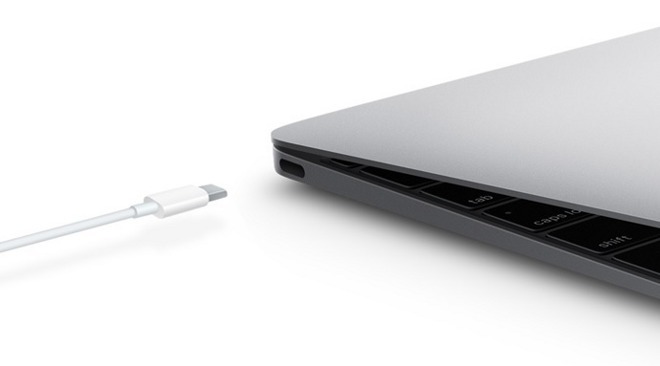USB Type-C protocol similar to MFi finalized, could block low-quality chargers
Future USB-C devices will confirm the authenticity of connected peripherals, which could lead to future iPhones, iPads, and Macs only accepting fully-compliant chargers and rejecting hazardous devices.

USB Type-C on a MacBook
The introduction of the authentication protocol offers a number of safeguards to both device producers and consumers, in keeping devices using the specification safe. In development for a number of years, the system will be able to determine if the other connected hardware, and even the cable itself, supports the same standards and can be deemed safe to use.
The USB Type-C authentication can prevent maliciously embedded hardware or software installed into USB devices that could try to exploit a USB connection. For example, this could prevent similar hardware to that of the GrayKey forensics tool that could extract data from a locked iPhone from working at all, if the tool is not authenticated, or from a maliciously-configured publicly-accessible USB charging point.
In enterprise, this could limit what kinds of devices can connect to others within a facility, offering increased security for sensitive data on the corporate network. For consumers, the system's policy could also prevent cheap third-party chargers from working at all with their iPhones, or restrict uncertified chargers to slower charging while certified versions could be allowed to perform fast charging, thereby limiting the possibility of an accessory-caused fire or overheating.
As well as being able to be controlled by defined security policies, the system also relies on 128-bit cryptography for further protection. As the authentication is performed on connection before any major power or data transfers begin, the system can prevent any inappropriate activity with uncertified hardware before anything else occurs between the two devices.
Apple is a member of the USB Implementers Forum, which makes it highly likely that future iPhones, iPads, and other hardware that either uses USB Type-C now or in the future will support the standard.

USB Type-C on a MacBook
The introduction of the authentication protocol offers a number of safeguards to both device producers and consumers, in keeping devices using the specification safe. In development for a number of years, the system will be able to determine if the other connected hardware, and even the cable itself, supports the same standards and can be deemed safe to use.
The USB Type-C authentication can prevent maliciously embedded hardware or software installed into USB devices that could try to exploit a USB connection. For example, this could prevent similar hardware to that of the GrayKey forensics tool that could extract data from a locked iPhone from working at all, if the tool is not authenticated, or from a maliciously-configured publicly-accessible USB charging point.
In enterprise, this could limit what kinds of devices can connect to others within a facility, offering increased security for sensitive data on the corporate network. For consumers, the system's policy could also prevent cheap third-party chargers from working at all with their iPhones, or restrict uncertified chargers to slower charging while certified versions could be allowed to perform fast charging, thereby limiting the possibility of an accessory-caused fire or overheating.
As well as being able to be controlled by defined security policies, the system also relies on 128-bit cryptography for further protection. As the authentication is performed on connection before any major power or data transfers begin, the system can prevent any inappropriate activity with uncertified hardware before anything else occurs between the two devices.
Apple is a member of the USB Implementers Forum, which makes it highly likely that future iPhones, iPads, and other hardware that either uses USB Type-C now or in the future will support the standard.

Comments
if Apple doesn’t charge companies that do go to the effort of compliance, people would have less of a problem with it.
The reasons for doing so are clear, it provides some protection against people selling cheap chargers that might blow up or cause an electrical fault, endangering users and reflecting badly on Apple. The downside is that it allows for Apple to completely restrict the use of third party peripherals to those that are "approved".
Most of the complaints about this kind of control currently seem to be from people skimping on components and using out of date chipsets (eg Thunderbolt 3 on the Mac won't work with older TB3 chipsets used by some makers in a rush to get to market with TB3 devices), but it could also be used to just stop anything that hasn't been certified as MFi. So far Apple hasn't done this with the current MFi program, but if they ever decided to do so, moving to USB-C might make it easier. What I do know is that, suddenly, using USB-C if/when Apple do it on all iDevices, will be painted as a bad thing by the same people who currently cite the proprietary Lightning connector as a bad thing. Probably for the same reasons.
When it comes to charging, making things proprietary or not universally compatible reduces utility. Who wants to put in hard-wired charging outlets if they are obsolete in a couple years... it forces you back into buying and carrying device-specific chargers.
Incidentally, quick history lesson: Apple used the 30-pin connector for nine years (2003-2012). Thus, Lightning will turn nine years old in 2021 ... so look to hear something about the future of Lightning at 2019's WWDC (assuming Apple wants to wait the whole nine years, which it might not given the popularity of USB-C/TB3 ports).